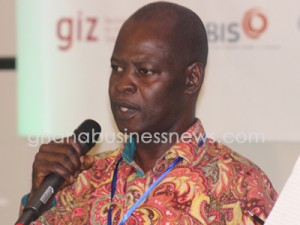Weak local content policies cause of low participation in petroleum sector

Dr. Steve Manteaw, chairman of the Public Interest and Accountability Committee (PIAC) has reiterated that the weaknesses in local content policies in the natural resource sector is cause for low participation of Ghanaians in the oil and gas industry.
He said policies governing the sector since its implementation six years ago is confronted with strong market forces that worked against the globally sourced industry, making it difficult for Ghanaian industries in the sector to break the barriers.
Dr. Manteaw made the revelation in Accra during a three- day training for Journalists on natural resource governance, organised by Civic Response, a natural resource and environmental policy advocacy organisation working to entrench resource rights and supported by Fern, an European Union Environmental Organisation.
He said though local content policies merited good, other aspects of it such annual fee payment of $30,000 US was hindrance for Ghanaian players, which according to him the renewable fees did not automatically guarantee local operators contracts.
Presenting a paper on oil and gas and legal framework guiding the implementation of the sector, the policy Analyst and Co- Chairperson of Ghana extractive Industry Transparency Initiative (GHEITI) indicated that indigenous participation was key in increasing benefits in the sector, challenges of high registration fees was very frustrating.
He said after six years of implementation of the LI 2204, which gives opportunities for Ghanaian participation in the upstream sector was beset with discrimination in target-setting principles, which also made it difficult to measure progress.
He indicated that the LI 2204 was the first in the oil and gas sector to be promulgated in Ghana, however, the five percent equity participation by Ghanaians was virtually absent, and the loyalty attached to political parties before winning contract bids affected the successful implementation of the policy.
“Either than the corporations qualified to enter into petroleum agreement, the choice of the entities for the five percent local participation is still problematic”. Dr Manteaw stressed.
He said improper targeting made it difficult to measure progress of the policy and therefore called for steps to address the situation.
He called for expedited action on need “to undertake an input-output analysis of the upstream petroleum sector to inform Ghanaian businesses of opportunities available on the supply side, as well as those on the value addition side”.
According to him, the L.I. 2204 made provision for quantitative targets setting for various positions, goods and services and noted that the policy did not provide achievable targets and urged policy makers to make the targets more measurable.
The LI was promulgated to promote maximisation of value addition and job creation through the use of local expertise, goods and services, business financing in the petroleum industry value chain and their retention in Ghana.
The Local Content Committee established by the board of the Commission, is required to oversee the implementation of the LI 2204.
Source: GNA
